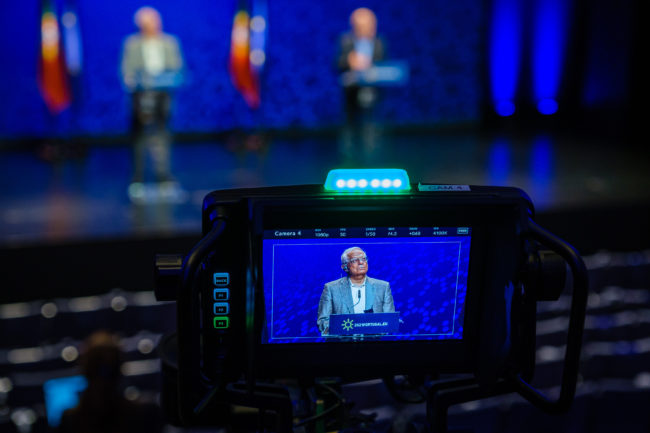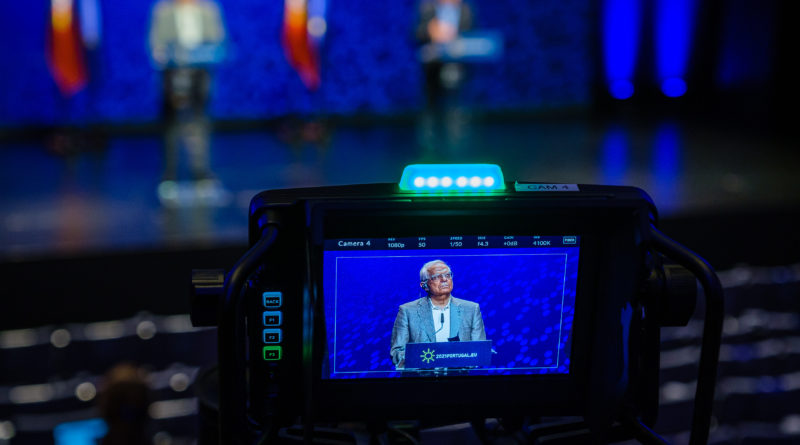The urgency of European defense (Josep Borrell)
(B2) The High Representative of the Union for Foreign Affairs and Security Policy insists: Europe can no longer ignore defense issues. In a world where power relations are essential, it must use all its tools to keep its place

- This statement is taken from the preface to our latest book "The European defense toolbox" (98 p.) which has just been published.
- Josep Borrell takes stock of all that has already been done, but also the pitfalls that stand in the way. Without too much fuss.
- An interesting point, as the informal meeting of Defense Ministers takes place this Friday (28.05) in Lisbon.
The urgent need for geopolitics
The European Union must become a real geopolitical actor. Everything in our environment reminds us of the urgent need for it.
The emergence of new empires
Instability is growing on the borders of Europe, encouraged by the " new empires » ; new threats appear in cyberspace for our democracies, but also for our essential infrastructures; multilateralism is weakened and all areas of international relations are used as weapons in increasingly fierce global competition...
Have a more strategic use of tools
For the European Union to adopt a more geopolitical stance implies first of all that we make more strategic use of the tools at our disposal to manage our economic relations with the rest of the world by better defending the values and interests of Europeans. And we started doing it in multiple ways. But this also implies, of course, that Europeans take better charge of their own security, coordinate their existing means more and equip themselves with new tools to deal with emerging threats.
Defence, the most difficult stage of European integration
This has never been the easiest part of the European integration process. Firstly because defense issues remain in people's minds among those most directly associated with the prerogatives of national states. And then because foreign and security policy matters remain subject to the rule of unanimity within the Union. A unanimity that our histories, our cultures, our different geographical situations do not always allow us to achieve easily and quickly. Despite these long-known difficulties, the efforts undertaken for three decades now, and in particular since the adoption in 2016 of the Global Strategy of the European Union, are beginning to bear fruit: the Union has gradually equipped itself with many relevant tools in this field.
Efforts to continue
The crisis triggered by the Covid-19 epidemic has shown both the extent of interdependencies on a global scale and the harshness of the balance of power with the diplomacy of masks, then of vaccines. But it also mobilizes, in a perfectly legitimate way, public finances to unprecedented levels on health, economic and social issues. Despite the pressure which is exerted, and will continue to be exerted tomorrow, on public finances, it is essential that the Union and its Member States pursue the efforts undertaken in the field of common security and defence.
'We haven't slowed down'
In the field...
Despite this crisis on an unprecedented scale, we have not eased off, however, at European level in the field of defense since I took office. We launched Operation Irini in the Mediterranean to enforce the arms embargo on Libya, expanded the mandate of Operation Atalanta off the Horn of Africa, implemented a new concept of maritime presence coordinated to fight against piracy in the Gulf of Guinea or even reinforced the European missions in the Sahel and launched a new civilian mission in the Central African Republic.
... as in the instruments
We also adopted the first sanctions in response to cyberattacks while strengthening our counter-disinformation capabilities. We have also launched the new European Defense Fund to support innovation in industries in the sector, while ensuring the consistency of these actions with other European initiatives in this area, in particular permanent structured cooperation and the coordinated annual defense review. .
A new strategic culture in the making
Finally, we have initiated the development of a Strategic Compass, a strategic compass, based on a shared diagnosis of the threats facing the Union. It aims to develop a common strategic culture, an essential prerequisite for a more integrated security policy.
Europe, NATO's best ally
The arrival of President Biden at the White House has made it possible to relaunch the transatlantic dialogue, particularly on defense issues, and we are delighted about this. However, this does not alter the need to strengthen the efforts of Europeans to better take charge of their own security. Not because it would be appropriate to question the transatlantic alliance which of course remains a pillar of our security policy, but on the contrary to strengthen it by becoming a better ally of the United States within NATO.
A still unfinished project
This book shows it and we are fully aware of it: the European security and defense policy is still an unfinished project. But, as we have already shown since December 2019, our determination is total to seize all opportunities in order to make it progress.
Josep Borrell
High Representative of the Union for Foreign Affairs and Security Policy
The European defense toolbox. 98 pages, 10 euros. Available here.
Titles and intertitles are editorial - text written before the latest events in Belarus.


